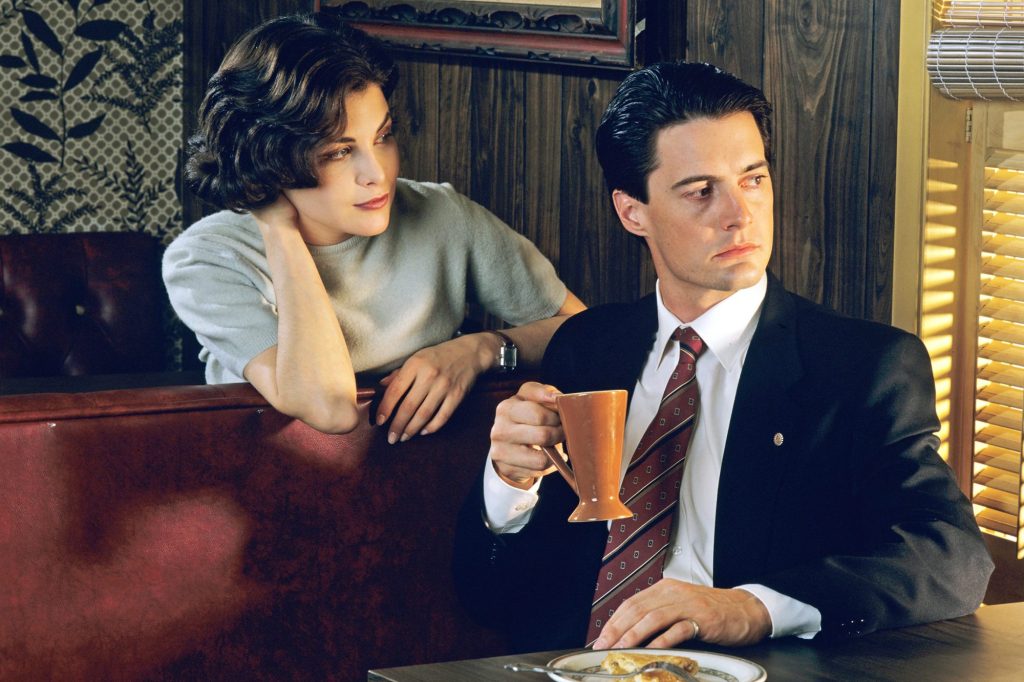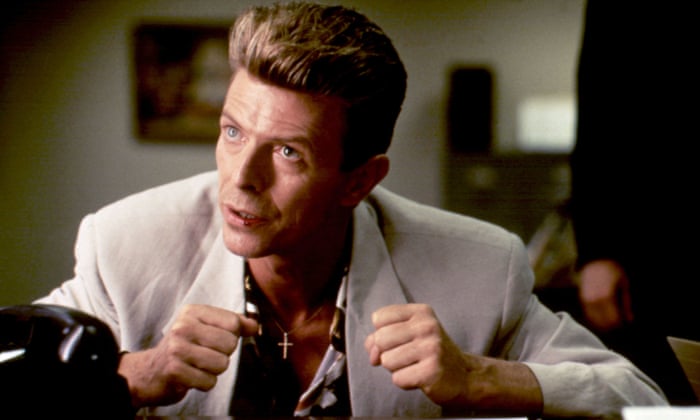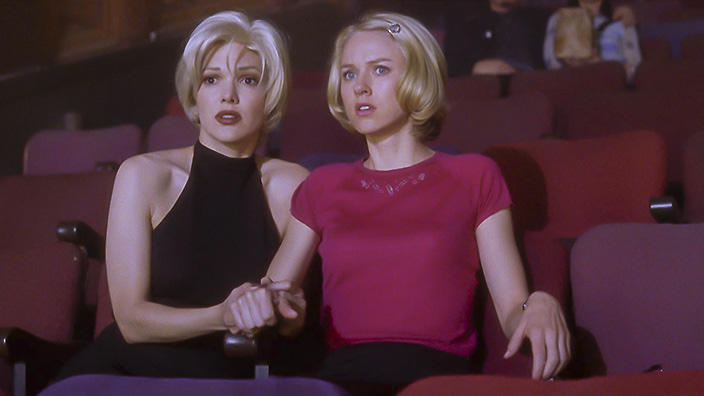David Lynch is one of the best auteurs we have left. His unique form of ambiguous, dream-like and non-plot centric narratives has created great frustration and controversy among many audiences and a small portion of film critics, namely, Roger Ebert (R.I.P.).
Ebert appreciated Lynch‘s technical proficiency and obvious talent, but was taken aback and at times violently offended by his seeming lack of empathy for his characters or disrespect for weight of his material. He was annoyed with how traumatic events were played for cheap laughs in Wild at Heart, but he downright hated how Blue Velvet, beloved by most critics including this one, treated its characters. He even hated what he perceived as mistreatment of the actors, namely Isabella Rossellini. Stripped naked, bruised and crying in front of Laura Dern‘s entire family, Ebert thought this was a terrible abuse of power and humiliating and cruel for the actress.
Roger Ebert is probably my favorite film critic to ever live, but even he made his fair share of bad calls. First of all, Isabella Rossellini is an actress and an adult, and fully capable and comfortable with herself enough to make that decision. Second of all, Ebert‘s argument seems overtly sexist, suggesting women are somehow too fragile unlike their male counterparts to push themselves into uncomfortable but consensual scenes for the sake of their art.
On the other hand, Naomi Watts revealed in an interview that she felt incredibly uncomfortable doing her intense, grief-driven masturbation scene in Mulholland Drive. But she also adds that she trusts David Lynch 100% and doesn’t have any regrets, evident in their continued screen collaborations.
Lynch is a controversial filmmaker and certainly not one for everyone, but he’s created a body of work that is invaluable to film history. This article will assess the complete David Lynch filmography as well the two Twin Peaks series, in chronological order.
1977 – Eraserhead

Right out of the gate, Lynch was showing us how little patience he had with traditional plot mechanics with arguably his most unconventional film. Eraserhead is beautifully and shamelessly an art film, stripped of nearly all character development and emotional arcs to deliver a metaphorical cautionary tale about the crippling responsibilities of raising a family. Shot in gorgeous black and white and featuring a wild assortment of different creatures, Eraserhead tells its story mostly through images. Makes sense for a painter’s debut film.
Oscar Nominations: 0
Verdict: 8/10
1980 – The Elephant Man

Really nothing you’d expect from a Mel Brooks/David Lynch collaboration, but here we are. After the critical and cult success of Eraserhead, Mel Brooks‘ personal assistant suggested Lynch for the directing gig of The Elephant Man, a project Brooks was trying to get off the ground as a producer. It proved to be a smart decision because Lynch‘s signature dream logic really helped break up the formalism of the material. The Elephant Man tells the story of a deeply intelligent man born with severe elephantiasis (a brilliant John Hurt) that people just wrote off as a monster or freak show attraction. Enter a suave British doctor played by Sir Anthony Hopkins, on a mission to help the man not only with his elephantiasis but make people realize there’s an incredibly gentle and intelligent soul behind his deformity. It’s Lynch‘s second most touching movie.
Oscar Nominations: Best Picture, Best Director – David Lynch, Best Actor in a Leading Role – John Hurt, Best Adapted Screenplay, Best Art Direction, Best Costume Design, Best Film Editing, Best Original Score.
Verdict: 8/10
1984 – Dune

After racking up some Oscar nominations with The Elephant Man, Hollywood took a major interest in David. They saw a great young talent so they decided to do what they always do to young talented up and coming directors, stick them with a completely unwinnable project that will turn into a studio controlled nightmare. Dune is such an evident studio hatchet job in that it makes these giant leaps from scene to scene without explaining anything. It’s visually stunning and on their own, none of the scenes are straight up terrible, but viewed together as a movie it makes absolutely no sense. Lynch was so fucking furious by this experience, it’s easy to see why he never relinquished absolute creative control again.
FUN FACT: Before Dune, Lynch was originally contacted by George Lucas to direct Return of the Jedi. Could you imagine that shit???
Oscar Nominations: Best Sound.
Verdict: 4/10
1986 – Blue Velvet

Lynch‘s anger over his Dune experience must have given him the push he needed, because in 1986, he delivered his first bona-fide masterpiece. Blue Velvet is a brutal but gorgeous examination of the artifice of the American Dream, opening on white picket fences, perfect rose bushes and friendly civil servants waving hello. The camera quickly nose dives into the grass and dirt to reveal beetles consuming each other before we begin our story about two idealistic teens (Kyle MacLachlan and Laura Dern) learning hard truths about life when a deranged stand-in for the devil (Dennis Hopper) torments and rapes a lounge singer (Isabella Rossellini) and kidnaps her child, for seemingly no reason. Rossellini is amazing but it’s the late Dennis Hopper that leaves the biggest imprint on the film as one of the most disgusting yet mesmerizing villains of all time.
Oscar Nominations: Best Director – David Lynch
Verdict: 10/10
1990 – Wild at Heart

The closest thing Lynch has ever made to a comedy and I’m here to tell you it’s problematic as fuck but still one of the funniest things I’ve ever seen. A perverse homage to The Wizard of Oz, Wild at Heart is about some wild libertarian fuck boi (Nicolas Cage) who is in love with a young woman who loves to fuck (Laura Dern) and both are on the run from the woman’s evil Southern mama (Diane Ladd, Dern‘s mother IRL) and a bunch of her goons (Harry Dean Stanton, J.E. Freeman, among others). And then Willem Dafoe shows up in the third act with tiny little teeth and a shotgun. It really is a wild movie with a lot of brilliantly flip comedic set pieces, so bizarre they serve as a prehistoric Tim & Eric sketch but somehow even darker. Also, it won the Palme D’or at Cannes and pissed everyone off.
Oscar Nominations: Best Supporting Actress – Diane Ladd
Verdict: 9/10
1990-1991 – Twin Peaks

Twin Peaks wasn’t just a popular TV show, it was a pop culture phenomenon that even had a weekly magazine dedicated to its on-going mystery of who in the small Washington town of Twin Peaks murdered prom queen Laura Palmer (Sheryl Lee). Enter quirky FBI Agent Dale Cooper (the magnificent Kyle MacLachlan) and a buttload of small town loonies, and you have what is the best written, most unpredictable and most self-aware soap opera ever made. Season 1 is just about perfect, but after they solve the mystery half-way through Season 2, it gets really, really dull. This is the most accessible thing Lynch has ever created and a great place to start if you’re new to his work.
Emmy Nominations: Outstanding Drama Series, Lead Actor in a Drama Series – Kyle MacLachlan, Supporting Actress in a Drama Series – Piper Laurie, Supporting Actress in a Drama Series – Sherilyn Fenn, Writing – “Pilot” and “Episode 3”, Directing – “Pilot”.
VERDICT: 9/10
1992 – Twin Peaks: Fire Walk With Me

One of the most unfairly hated of all Lynch‘s films, this prequel to Twin Peaks doesn’t even begin to deliver the closure fans surely were anticipating. Quentin Tarantino is said to have stormed out of a screening saying he lost all faith in Lynch as a filmmaker. What pricks, cause this is really fascinating and surprisingly powerful material that bucks traditional narrative storytelling at every turn. It’s far from perfect, but it creates a very controlled mood and hey, David Bowie AND Chris Issak are in it!
Oscar Nominations: 0
VERDICT: 7/10
1997 – Lost Highway

This one really didn’t work for me. Besides IRL murderer Robert Blake as a creepy videocamera man and a hilariously unhinged Robert Loggia in a road rage scene for the ages, nothing about Lost Highway grabbed me. Bill Pullman is a sad saxophonist who might also be a death row inmate/Belthazar Getty or something. Good thing he’s having sex with Patricia Arquette! It’s a confusing mess and the cinematography is obnoxious and flashy, uncommon for Peter Deming, calling to mind the gross quick cuts of a Tony Scott film. Bottom line, Lost Highway doesn’t come close to stirring up your emotions like Lynch‘s most effective work. I do love Angelo Badalamenti‘s sexy jazz score though.
Oscar Nominations: 0
Verdict: 5/10
1999 – The Straight Story

David Lynch directs his first and only G-rated Disney movie about a lovable old coot (Richard Farnsworth) who needs to travel across several states on his John Deer tractor to visit his dying brother. Sissy Spacek plays his intellectually-disabled daughter who lovingly disapproves of this mission. I don’t know why they call Wild at Heart the Wizard of Oz story, because this is much more in keeping with the plot of Wizard of Oz. This movie is all about the good natured people, from all different walks of life, that Richard Farnsworth interacts with and affects. It’s honestly really wholesome and touching.
Oscar Nominations: Best Actor – Richard Farnsworth
Verdict: 7.5/10
2001 – Mulholland Drive

If Blue Velvet is David Lynch‘s first bona-fide masterpiece, then Mulholland Drive is his magnum opus. Endlessly re-watchable, I’ve seen it eight times so far, and I’m still unpacking it. No film captures the feeling of a dream more than David Lynch’s Mulholland Drive. It’s a masterfully constructed mind-fuck that progresses through emotions, riddles and visual metaphors rather than a traditional narrative structure. It’s that nightmare we all have about our inadequacy, of being rejected, of being cheated, of realizing we actually have no worth, all seen through the eyes of a powerhouse Naomi Watts. No hay banda, and yet we hear a band. It’s not only Lynch‘s best film, it’s one of the best films I’ve ever seen.
Oscar Nominations: Best Director – David Lynch
Verdict: 11/10
2006 – Inland Empire

At a whopping 3 hours, this is Lynch’s longest film. It’s also his most avant-garde and hardest film to get through. There’s a lot of strengths here, namely Laura Dern‘s brilliant performance that clearly demanded so much work from the artist. Also, the whole low energy rabbit sitcom thing and a brief but high energy William H. Macy appearance. But, there’s a lot I just didn’t get. The locomotion dance sequence with Jeremy Irons and women was like, what the fuck was that? Also, the choppy way it’s shot on digital, it looks like America’s Funniest Home Videos. Inland Empire is a tremendous struggle to get through and at the end you’re left with something you admire far more than you like. I think it might be impossible to enjoy this movie. Still, Laura Dern was soooo robbed of an Oscar nomination. No one in 2006 was better than she is in this movie.
Oscar Nominations: 0
Verdict: 6.5/10
2017 – Twin Peaks: The Return

Actually surpasses the original series in terms of overall quality and daring, Twin Peaks: The Return is pure, 100% unfiltered Lynch. 18 one-hour episodes that manage not only to bring back the original cast and respectfully close out their storylines, but also juggle dozens of new characters that are equally as fascinating. Resisting the urge to get all sentimental like pretty much every other revival series, Twin Peaks: The Return is miracle television that is allowed to happen only when non-creatives butt the fuck out.
BONUS: There’s a five hour making of documentary on the blu-ray box set that is among the best I’ve ever seen. If you want to see Jim Belushi awkwardly meet Naomi Watts for the first time or Sherilyn Fenn trying to bum a cigarette off of Lynch without asking, surely the tenth bum of the day.
Emmy Nominations: Best Directing – “Episode 8”, Best Writing – “Episode 8”
Verdict: 9.5/10
FINAL RANKING OF WORK
- Mulholland Drive
- Blue Velvet
- Twin Peaks: The Return
- Twin Peaks
- Wild at Heart
- Eraserhead
- The Elephant Man
- The Straight Story
- Twin Peaks: Fire Walk With Me
- Inland Empire
- Lost Highway
- Dune

